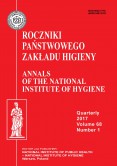Rocz Panstw Zakl Hig 2004, 55(4): 347-356
Badania ankietowe dotyczące sytuacji bytowej oraz zwyczajów żywieniowych studentów
[Questionnaire studies on the vital situation and nutritional habits of students]
STRESZCZENIE
W pracy przedstawiono wyniki badań ankietowych przeprowadzonych w roku akademickim 2001/2002 wśród 230 studentów Akademii Rolniczej w Szczecinie. Studenci otrzymali kwestionariusz ankiety z pytaniami zamkniętymi. Każda z osób została scharakteryzowana za pomocą kilkunastu cech określających jej status społeczno-ekonomiczny. Część drugą stanowiły szczegółowe pytania dotyczące zwyczajów żywieniowych studentów. Wstępną charakterystykę osób oceniono na podstawie utworzonych dla badanych zmiennych tabel liczebności. Do oceny statystycznej niezależności cech przeprowadzono test Chi2. Po przeanalizowaniu otrzymanych danych stwierdzono istotny wpływ wybranych czynników na niektóre elementy życia studenckiego oraz upodobania żywieniowe ankietowanych m.in. miejsca zamieszkania podczas nauki, otrzymywania stypendiów, podejmowania pracy dorywczej, a także np. częstotliwości spożywania posiłków.
ABSTRACT
Results of questionnaire studies carried out in 2001/2002 among 230 students of University of Agriculture in Szczecin were presented. It served for assessing their material and living situation during studying at the University. Women and people originating from cities dominated in studied group of respondents. Probably, there is a decreasing tendency referring to attending the University by country people. Residence during studying depended on the year of education and origin of respondents. Last-year students and country people were more often placed in hostel. Material help in a form of social scholarship was more often assigned to country youth, and scientific grants were more frequently given to fifth-year students. No finance help of student’s families made they undertook a part-time job that was made more often by final-year students. Significant differences referring to consumption customs often depended on sex. Students themselves most often prepared meals, including dinners. Only small per cent (12%) of students went to canteens, milk bars or other restaurants. Almost one-third of respondents fed irregularly. One-dish dinners consisting most often of purchased or earlier prepared semi-products dominated. Majority of students declared feeding meat, poultry, and sweets at least once a week, as well as fish – at least once a month. Every second person declared everyday consumption of fruits and vegetables, milk and its products as well as several cups of coffee daily; it referred more often to women. Most of respondents occasionally consumed sprinkle, low-alcoholic beverages and snacks in a form of chips and nuts, but they were more often men.
Downloads: 1999


